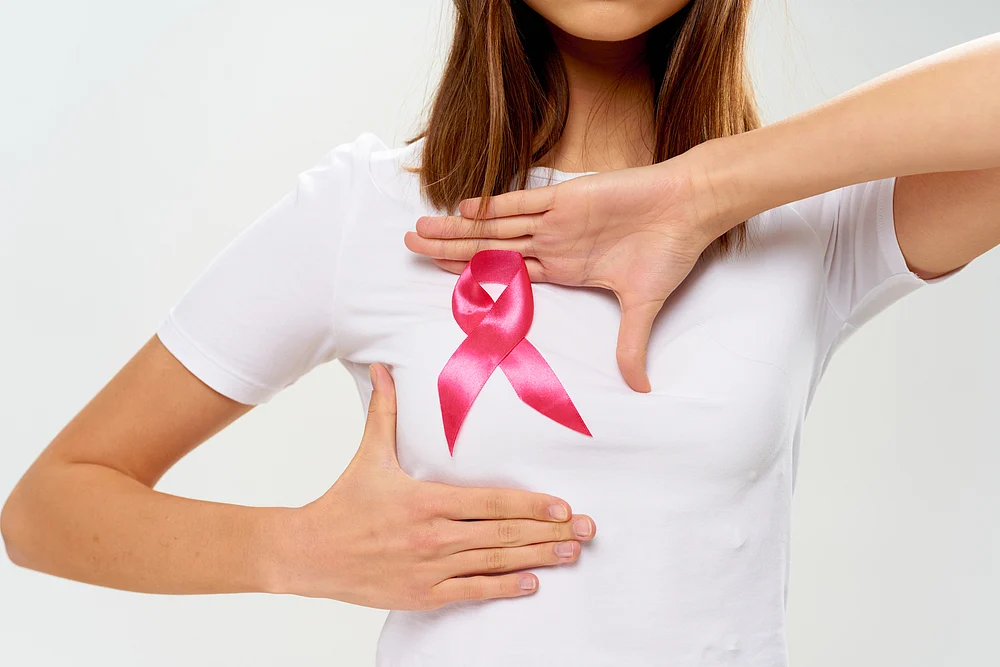Health
Tackle Breast Cancer: Awareness and Ayurvedic Solutions for Health

October marks Breast Cancer Awareness Month, a time dedicated to raising awareness about breast cancer’s prevalence and supporting those affected by the disease. This year, India is projected to see 232,832 new cases of women diagnosed with breast cancer, highlighting the urgent need for education and preventive measures.
Breast cancer occurs when cells in the breast become malignant, leading to the formation of tumors. While the condition typically affects women over the age of 50, there has been a notable increase in cases among younger women. Factors contributing to this rise include genetics, hormonal changes, and lifestyle choices such as alcohol consumption, smoking, obesity, and physical inactivity. Symptoms may present as a lump in the breast or armpit, changes in breast size or shape, skin redness, or unusual nipple discharge.
Understanding the disease and its risk factors is crucial for prevention. Ayurveda, a traditional Indian system of medicine, offers various approaches to managing health and potentially mitigating the risk of breast cancer. By focusing on the balance of Doshas—the body’s vital energies—Ayurveda provides dietary, lifestyle, and herbal recommendations aimed at improving overall health.
Four Ayurvedic Strategies for Managing Breast Cancer
1. **Herbs**: Incorporating specific Ayurvedic herbs into one’s diet can enhance treatment and bolster the immune system. Notable herbs include Amla, Ashwagandha, Turmeric, Tulsi, and Giloy. These natural remedies are known for their health benefits and ability to purify the body.
2. **Diet**: Ayurveda emphasizes consuming foods tailored to one’s individual Dosha. A diet rich in fresh fruits and vegetables, whole grains, and dairy products is recommended. Staying hydrated with water and herbal drinks is essential, while processed foods and items with carcinogenic ingredients should be avoided.
3. **Lifestyle**: Regular physical activity, including exercises, yoga, and meditation, plays a critical role in maintaining a healthy body weight, which can reduce cancer risks. It is advisable to avoid substances that may contribute to cancer, such as tobacco and alcohol.
4. **Medical Care**: Regular screenings, such as mammograms, are vital for early detection of breast cancer. Engaging in discussions with healthcare providers about family history and any potential therapies or dietary changes can provide additional safety measures.
Additionally, Ayurvedic products from Patanjali can support overall health. Divya Cystogrit, for example, is designed to help manage cysts and tumors while providing energy and stress relief. It contains beneficial ingredients like turmeric and various Ayurvedic herbs. Another product, Shatavar Churna, focuses on enhancing women’s reproductive health, boosting immunity, and alleviating discomfort such as muscle pain.
As Breast Cancer Awareness Month unfolds, it is essential to empower individuals with knowledge and resources to combat this serious illness. By embracing a holistic approach through Ayurveda and regular medical consultations, one can work towards a healthier lifestyle and potentially reduce the risks associated with breast cancer.
-

 World5 months ago
World5 months agoSBI Announces QIP Floor Price at ₹811.05 Per Share
-

 Lifestyle5 months ago
Lifestyle5 months agoCept Unveils ₹3.1 Crore Urban Mobility Plan for Sustainable Growth
-

 Science4 months ago
Science4 months agoNew Blood Group Discovered in South Indian Woman at Rotary Centre
-

 World5 months ago
World5 months agoTorrential Rains Cause Flash Flooding in New York and New Jersey
-

 Top Stories5 months ago
Top Stories5 months agoKonkani Cultural Organisation to Host Pearl Jubilee in Abu Dhabi
-

 Sports4 months ago
Sports4 months agoBroad Advocates for Bowling Change Ahead of Final Test Against India
-

 Science5 months ago
Science5 months agoNothing Headphone 1 Review: A Bold Contender in Audio Design
-

 Top Stories5 months ago
Top Stories5 months agoAir India Crash Investigation Highlights Boeing Fuel Switch Concerns
-

 Business5 months ago
Business5 months agoIndian Stock Market Rebounds: Sensex and Nifty Rise After Four-Day Decline
-

 Sports4 months ago
Sports4 months agoCristian Totti Retires at 19: Pressure of Fame Takes Toll
-

 Politics5 months ago
Politics5 months agoAbandoned Doberman Finds New Home After Journey to Prague
-

 Top Stories5 months ago
Top Stories5 months agoPatna Bank Manager Abhishek Varun Found Dead in Well









